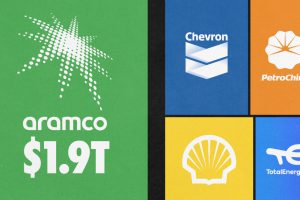The Largest Oil & Gas Companies in 2021
This was originally posted on Elements. Sign up to the free mailing list to get beautiful visualizations on natural resource megatrends in your email every week.
The pandemic brought strong headwinds for the oil and gas industry, and oil majors felt the blow.
Global primary energy consumption fell by 4.5% relative to 2019 and oil demand declined by 9%. For a brief period in April 2020, the price of West Texas Intermediate (WTI) crude futures went subzero, marking the largest one-day price plunge since 1983.
Some expected the demand crash to have a lasting impact on the industry, but it’s safe to say that 2021 has proved otherwise.
Oil Resurfaces as Energy Crisis Deepens
The world is facing a shortage of energy, and peak winter is yet to hit most parts of the globe.
Pandemic-induced supply restraints from producers, in addition to rising energy demand from recovering economies, have sent nations scrambling for petroleum products. Consequently, oil prices are resurfacing to pre-pandemic levels.
As of today, prices of WTI crude futures are at their highest levels in the last five years at over $80 per barrel. Furthermore, U.S. natural gas prices hit a 7-year high of $6.5 per million British thermal units (BTU) earlier this month. Elsewhere, European benchmark natural gas futures have surged 1,300% since May 2020.
Of course, the largest oil and gas companies are riding this wave of resurgence. Using data from CompaniesMarketCap.com, the above infographic ranks the top 20 oil and gas companies by market cap as of October 7, 2021.
Big Oil: The Largest Oil and Gas Companies by Market Cap
Given that we often see their logos at gas stations, the largest oil and gas companies are generally quite well-known. Here’s how they stack up by market cap:
| Rank | Company | Market Cap* (US$, billions) | Country |
|---|---|---|---|
| 1 | Saudi Aramco | $1,979 | Saudi Arabia 🇸🇦 |
| 2 | ExxonMobil | $257.30 | U.S. 🇺🇸 |
| 3 | Chevron | $205.29 | U.S. 🇺🇸 |
| 4 | Shell | $175.28 | Netherlands 🇳🇱 |
| 5 | PetroChina | $162.55 | China 🇨🇳 |
| 6 | TotalEnergies | $130.56 | France 🇫🇷 |
| 7 | Gazprom | $121.77 | Russia 🇷🇺 |
| 8 | ConocoPhillips | $95.93 | U.S. 🇺🇸 |
| 9 | BP | $93.97 | U.K. 🇬🇧 |
| 10 | Rosneft | $84.07 | Russia 🇷🇺 |
| 11 | Equinor | $83.60 | Norway 🇳🇴 |
| 12 | Enbridge | $82.82 | Canada 🇨🇦 |
| 13 | Sinopec | $80.48 | China 🇨🇳 |
| 14 | Novatek | $79.18 | Russia 🇷🇺 |
| 15 | Duke Energy | $78.08 | U.S. 🇺🇸 |
| 16 | Petrobras | $69.91 | Brazil 🇧🇷 |
| 17 | Southern Company | $66.64 | U.S. 🇺🇸 |
| 18 | Lukoil | $64.70 | Russia 🇷🇺 |
| 19 | CNOOC | $52.04 | China 🇨🇳 |
| 20 | Enterprise Products | $50.37 | U.S. 🇺🇸 |
*As of October 7, 2021.
Saudi Aramco is one of the five companies in the trillion-dollar club as the world’s third-largest company by market cap. Its market cap is nearly equivalent to the combined valuation of the other 19 companies on the list. But what makes this figure even more astounding is the fact that the company went public less than two years ago in December 2019.
However, the oil giant’s valuation doesn’t come out of the blue. Aramco was the world’s most profitable company in 2019, raking in $88 billion in net income. Apple took this title in 2020, but high oil prices could propel Aramco back to the top in 2021.
Although Standard Oil was split up a century ago, its legacy lives on today in the form of Big Oil. ExxonMobil and Chevron—the second and third-largest companies on the list—are direct descendants of Standard Oil. Furthermore, Shell and BP both acquired assets from Standard Oil’s original portfolio on the road to becoming global oil giants.
The geographical distribution of the largest oil and gas companies shows how global the industry is. The top 20 oil and gas companies come from 10 different countries. The U.S. hosts six of them, while four are headquartered in Russia. The other 10 are located in one of China, Brazil, Saudi Arabia, or Europe.
Big Oil, Bigger Emissions
Due to the nature of fossil fuels, the biggest oil and gas companies are also among the biggest greenhouse gas (GHG) emitters.
In fact, Saudi Aramco is the world’s largest corporate GHG emitter and accounts for over 4% of the entire world’s emissions since 1965. Chevron, Gazprom, ExxonMobil, BP, and several other oil giants join Aramco on the list of top 20 GHG emitters between 1965 and 2017.
Shifting towards a low-carbon future will undoubtedly require the world to rely less on fossil fuels. But completely shunning the oil and gas industry isn’t possible at the moment, as shown by the global energy crisis.





